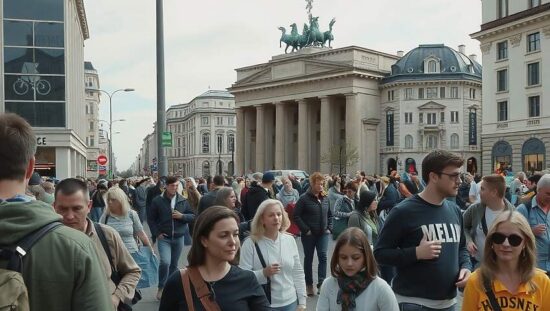Berlin’s governing mayor, Kai Wegner of the CDU, is pushing for the formal inclusion of citizen referendums within the city’s constitution before the upcoming Berlin elections. Wegner, in an interview with “Der Tagesspiegel”, expressed hope that a law will be introduced and passed before the current legislative term concludes, signaling a significant maneuver to potentially shift the balance of power towards more direct citizen input.
The proposal, currently under discussion with the SPD coalition partner, requires not only legislative action but also a constitutional amendment, necessitating the support of both the Green Party and the Left Party. Securing a two-thirds majority in the Berlin Abgeordnetenhaus, a feat demanding cross-party collaboration, represents a substantial political hurdle.
Wegner appealed to members of the governing black-red coalition to demonstrate “a clear commitment” to the introduction of referendums, urging them to propose specific mechanisms allowing the Senate to facilitate these consultations. While acknowledging the potential for such referendums to inform decisions regarding the contentious issue of a Berlin Olympic bid and previously implemented concerning the Tempelhofer Feld, Wegner envisions a broader application, claiming citizen consultation should be prioritized for “all important issues.
Despite his ambition, Wegner downplayed the likelihood of a referendum on the Olympic bid being completed before the 2026 elections, highlighting the importance of the Landessportbund’s signature collection effort currently underway. This petition, aiming to gather 20,000 signatures to initiate a citizen initiative (lacking the immediate legal ramifications, unlike a successful law-based referendum), represents a parallel, grassroots effort to gauge public support for the Games.
The proposal has met with immediate resistance from opposition parties. Werner Graf, parliamentary group leader for the Green Party, criticized the initiative as a tool for the ruling parties, rejecting any willingness to support a constitutional amendment. Concerns are particularly focused on the potential reversal of the legally binding 2014 referendum regarding the Tempelhofer Feld, where ongoing developments suggest a shifting public opinion favoring limited construction on its periphery. A referendum could effectively provide the CDU and SPD with a mandate to amend the existing protections, a scenario the Greens are actively attempting to avert.
The Left Party echoed these sentiments, arguing that referendums represent a democratic instrument for citizens, not a tool for governing bodies to manipulate public opinion. Anne Helm, parliamentary group leader for the Left, specifically cautioned against “top-down referendums” highlighting the inherent power imbalance when politicians dictate the content, formulation and timing of a vote.
While the SPD has historically supported the concept, acknowledging that a constitutionally sound framework is lacking, the party’s call for a formal submission by the Senate signals a cautious approach. The debate highlights the complexities of direct democracy in practice, with fundamental disagreements emerging over the role of referendums in the urban political landscape and the potential for misuse by established power structures. The coming weeks will be crucial in determining whether Wegner’s push for constitutional reform can overcome the multifaceted opposition and the deep-seated concerns surrounding the application of referendums in Berlin.





